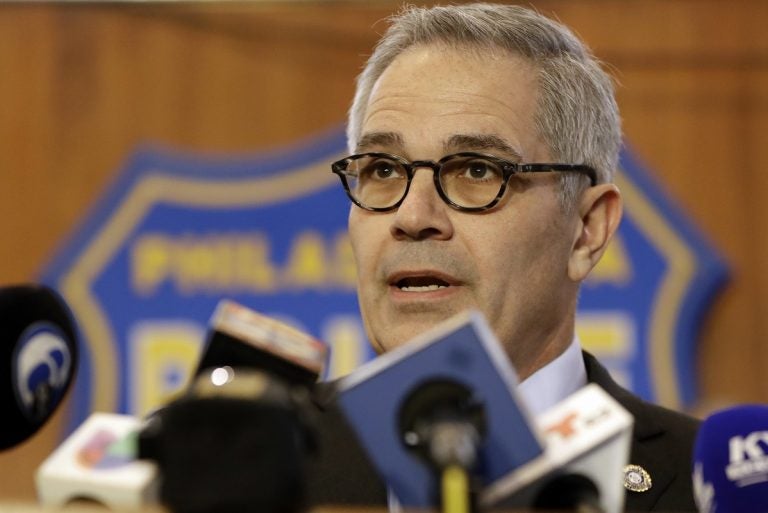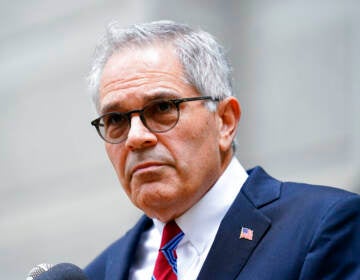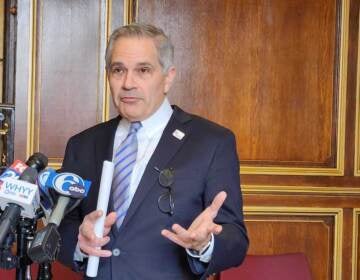Philly DA Krasner wants to personally try cases in 2019
During an appearance on WHYY’s Radio Times, Krasner says he now wants to see what the other side of the courtroom feels like.

Philadelphia District Attorney Larry Krasner was elected in 2017 in part with a surge in turnout among younger, progressive voters. (Matt Slocum/AP Photo)
This article originally appeared on PlanPhilly.
—
Supporters of Philadelphia DA Larry Krasner voted him into office to be something of an anti-prosecutor — a former defense attorney with deep criminal justice reform bona fides.
But during an appearance on WHYY’s Radio Times, Krasner says he now wants to see what the other side of the courtroom feels like. Preferably, in person.
“I haven’t had a chance to do what I used to do all the time, which is, go to court and actually try cases,” he said. “I’m hoping to try cases next year.”
Krasner said he was interested in cases both large and small.
“I do think there is a role in picking cases that have some importance to the public and to restore faith in the system,” Krasner explained. “Or possibly, the flip side … very mundane ordinary cases, so the troops under, by which I mean these almost 300 [assistant district] attorneys, know the person sitting in the chair knows how to do the same stuff.”
Krasner was joined on the air by Nueces County DA Mark Gonzalez, another former defense attorney-turned-reformist DA who now tries cases in his Texas district. The Philadelphia DA expressed admiration for the Corpus Christi prosecutor.
“I’ve been in a few times, standing up in a particular hearing or with a judge or to confer,” he said. “I do miss the courtroom … I love trying cases.”
Former Philly DA and Pennsylvania governor Ed Rendell, said that it was not uncommon for the top prosecutors in some suburban or rural counties to helm big cases. But these are offices with smaller staffs and caseloads –– Rendell couldn’t immediately recall a predecessor or successor doing anything similar in Philadelphia.
“In big DA offices, the DAs generally do not try cases,” he said. “I wanted to do it, but decided not to. I didn’t have enough time.”
But that didn’t mean it was a terrible idea for a defense attorney-turned-prosecutor. Rendell added that some of “the most effective trial lawyers were people who had the experience of working in the public defender’s office.”
And he said it could also lend Krasner, who has been attacked in the past for his lack of prosecutorial experience, more credibility with his own staff.
“All the ADAs knew what I was doing in my role as an assistant DA, so I didn’t need to do that. They knew I had come up through the ranks,” Rendell said. “If Larry wants to try cases to show his staff that he understand their burdens, he can do that. He just can’t go into court with more resources than they do.”
Rendell cautioned direct involvement of the DA can also skew the perceived importance of a case as media outlets glom on to the spectacle of an elected official taking on an accused criminal.
“In a big city, if the DA tries the case, it would get a lot more attention,” Rendell added.
Krasner also touched on other topics during the wide-ranging interview.
Candid views of a controversial DA
On criticism over light sentencing in the Jovaun Peterson case: “We admit that a mistake was made … It will be remedied in court or at the parole end. Meaning that when it comes time for the defendant to be considered for parole my office will say what it has to say about whether we think enough time has been served … In three and a half years there will be consideration, and about half the time, parole is rejected. When the DA weighs in heavily saying ‘don’t parole,’ that is a factor considered by the parole board.”\
On recent criticisms from US Attorney William McSwain: “It’s not personal. I think he’s doing the political bidding of the Trump administration … I don’t think it’s all that important.”
On understanding victims’ grief: “Absolutely, I understand that. And know that if someone killed a family member of mine, my initial reaction would probably not be to resort to the law. I would probably feel an impulse to get a gun and find them myself … This is the reason why … the family cannot be the judge in a case.”
On whether or not Immigration and Customs Enforcement should be abolished: “The short answer is, in many ways, yes. It has become something that the INS did not use to be. A lot of us are sick of hearing about seven-year-olds dying.”
On not seeking first-degree charges in the Sean Schellenger stabbing: “The oath of a prosecutor is to seek justice, not an unjust conviction. What’s happened in Philadelphia is that prosecutors have been political and have always pursued the highest charge, even when they knew there was no basis. They’ve basically been lying to victims and misleading victims and their families by saying ‘Sure, we’ll go for the death penalty, Sure we’ll go for first degree.’ ”
On sympathizing with past district attorneys Krasner had once criticized: “I understand it more now that I’m in office than before. Because there are consequences … One of those consequences is that sometimes journalists…instead of covering what’s happening in a systematic way they jump on it…I think there was a little bit more method and a little less madness than I thought when it comes to the cynical way that prior prosecutors have dealt with victims. I think the truth is they have their reasons and the reason was to never been called out in the press by victims.”
WHYY is your source for fact-based, in-depth journalism and information. As a nonprofit organization, we rely on financial support from readers like you. Please give today.






